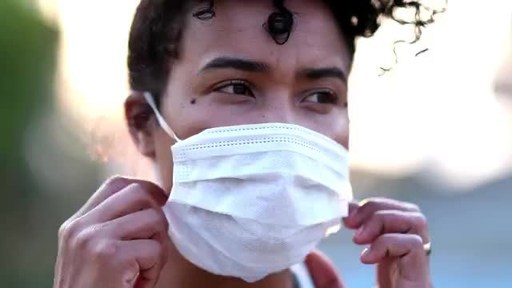CHICAGO, Oct. 12, 2021 /PRNewswire/ -- The American Health Information Management Association (AHIMA) Foundation today released the results of a new survey uncovering widespread confusion among Americans when it comes to their health information. The survey found that 3 in 4 Americans do not leave their doctor's office on a positive note for reasons that include disappointment in the level of Q&A they have with their doctor, confusion about their health, and a need to do more research. This lack of understanding is shared by most Americans, with nearly 2 in 3 respondents admitting they are not extremely confident in their understanding of the health information they discuss with their doctor.
Access to and understanding of health records and information is critical to consumer health management. Unfortunately, more than half of respondents (52%) report that they rarely access their medical records to review their health information. In fact, 1 in 4 Americans don't know where to go to access their medical and health information.
Research shows that low health literacy is correlated with increased emergency room visits, hospital stays, and higher mortality rates. AHIMA Foundation's mission is to empower people to take control of their health through improving health literacy. These findings further illuminate the American health literacy crisis.
During Health Literacy month this October, AHIMA Foundation has released a toolkit of easy-to-use English and Spanish language online health literacy resources at healthinfoexplained.org. The site provides practical resources and tools aimed at improving overall health literacy, including explaining individuals' rights surrounding their own online health information and solutions for improving communication with doctors about accessing online health information and patient portals.
The survey results further illustrate that barriers to health literacy most adversely affect traditionally medically underserved communities.
"While access to online health information and medical records plays an important role in bringing clarity to one's understanding of their health, members of medically underserved communities face additional barriers to accessing and utilizing their online health information," says Lisa K. Fitzpatrick, MD, MPH, MPA, Founder & CEO, Grapevine Health. "It's critical that Americans are able to retrieve their medical information to get a whole picture of their health for more positive outcomes."
According to the study, if Americans were able to have a whole picture of their health, they'd see noticeable changes. Four in five Americans agree that if they had access to all their health information, including medical records, recommendations, conditions, and test results, they'd see at least one improvement in their health management, including improvement in their confidence in understanding their health, improvement in the management of their health, and improvement in their trust in their doctor's recommendations.
"We know based on these results that a majority of Americans aren't fully grasping information discussed with their health care provider, leading many patients and caregivers to turn to the internet to take their health management into their own hands" says Anisa Tootla, Executive Director, AHIMA Foundation. "But many - especially members of medically underserved communities - are lacking a key piece of the health management equation: access to and an understanding of their personal medical information and online records. AHIMA Foundation is working to help change that."
Key Study Findings:
An overall lack of understanding:
- Many don't understand all the medical information their doctor provides (24%) -or even remember it immediately following a visit (31%).
- 15% -or nearly 37 million- Americans admit they sometimes feel more confused about their health than they did before their appointment.
- 3 in 4 (76%) -or 187 million- Americans report that they do not leave their doctor's office on a positive note.
- 1 in 4 (24%) -or 59 million- Americans don't know where to go to access their health and medical information.
Medically underserved communities are disproportionately affected:
- Lower income individuals are less likely than those earning more to at least somewhat agree that they understand the medical information their doctor shares (LT 50k 71% vs. 50-100k 79%, MT 100k 84%).
- Lower income individuals are less likely to have ever accessed their medical records or know where to go to access their medical information and health data (LT 50k 71% vs. 50-LT 100k 81%, MT 100k 84%).
- Lower income individuals are less likely to use an online platform or portal to access their medical records (LT 50k 76% vs. 50-LT 100K 86%, MT 100K 88%).
- Hispanics are more likely than their peers to leave their doctor's appointment not feeling positively (White 75%, Black 75%, Hispanic 83%).
- White Americans are more likely than other groups to use the Internet to seek out health information or answers about specific medical questions or conditions (White 59%, Black 40%, Hispanic 48%).
The potential of health information:
- If Americans were able to have a whole picture of their health, they'd see noticeable changes. Four in five (81%) Americans agree that if they had access to all their health information, including medical records, recommendations, conditions, and test results, they'd see at least one improvement in their health management.
To learn more about the Health Literacy for Health Equity initiative, visit AHIMAFoundation.org/about-us/health-literacy-for-health-equity-initiative/.
About the Survey
The nationwide survey, by Kelton Global, was conducted from July 26 to August 2, 2021, on behalf of AHIMA Foundation. The survey was among a nationally representative sample of 1,059 U.S. residents ages 18 and over. View the full results here.
About AHIMA Foundation
Established as a nonprofit in 1997, the AHIMA Foundation is the 501(c)3 charitable affiliate of the American Health Information Management Association (AHIMA). The AHIMA Foundation champions inclusive health data access and understanding through consumer education, training for health information professionals, and collaboration with strategic partners across the healthcare ecosystem. Visit AHIMAFoundation.org and watch the AHIMA Foundation - Who We Are video to learn more.
Media Contact: Jenifer Slaw, [email protected]
SOURCE AHIMA Foundation

WANT YOUR COMPANY'S NEWS FEATURED ON PRNEWSWIRE.COM?
Newsrooms &
Influencers
Digital Media
Outlets
Journalists
Opted In

Share this article